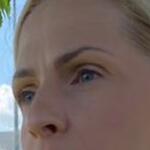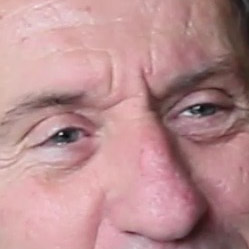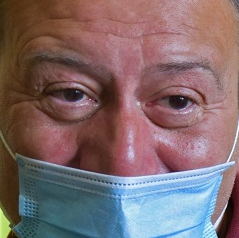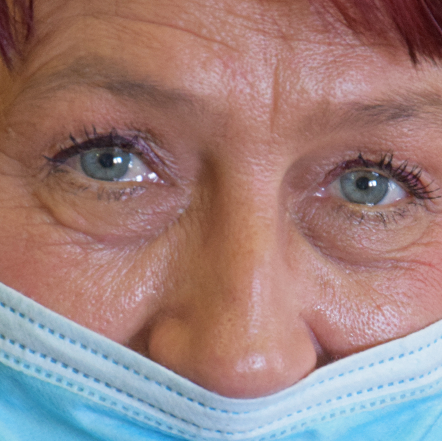A small room, all bathed in white daylight with two tables and four chairs. All eyes were fixed on Atefa, and her eyes were the only thing you could see behind the blue protective mask that hid almost her entire face. And the eyes told the whole story for themselves.
She’s nervous. “This is the first time I’m speaking to someone from the press.” Atefa sits silently, playing with her hands. She is a 45-year-old Christian woman from Iran who, together with her husband, her 19-year-old son and 15-year-old daughter, found her home in Thessaloniki three years ago.
She’s searching for her words for a few moments then says: „Iran is this really big and great and nice country.” She stops for a little bit, then continues: „The religious regime in Iran…That’s not what people need”. Atefa is „guilty” for not being a Muslim. That’s why she is framed as a sinner in her own country.
„I don’t believe in hijab.”
Atefa proceeds to speak about the people from Iran.
„They are hospitable and they want peace.” She is also saying that media is showing the opposite. „I see people who are traveling to Iran and they describe it completely different from what we usually see in media. They are shocked because we’re not terrorists. Iranian people are not terrorists. The regime and the media show that.” She emphasizes the idea that a distinction must be made between Iranians as small and ordinary people and Iranians as authorities. „People are completely different from how the media portrays them, so the image of Iran in the world is completely distorted.”
How did Atefa decide to leave Iran
She says her decision to leave Iran was not an easy decision.
„I was struggling with myself day and night, I was fighting with myself.”
She says that every time she went to visit her family or friends, she had to put on the mask of a good religious woman, which she, by the government’s definition, is not.
„We had to pretend to pray, we had to pretend that we didn’t eat anything in Ramadan, we had to pretend to be what we are not” describes Atefa and adds that her family was not supposed to know that behind Atefa’s hijab there is a cross hidden deep down in her heart. That was the reason they all had to leave.
„It was my home country, I didn’t want to leave it. But after this long struggle I made a decision.”
And now she’s here, in Greece. But Atefa still doesn’t feel like she’s part of the community, although she found her peace here.
The Iranian community
„If you don’t pretend, you’re banished from the community. If you don’t obey the government, nobody will accept you.” She pauses and looks deep into our eyes. „You have to mind your tongue. Keep your thoughts to yourself, do not express them.”
Everyone who is different faces anger. „My husband and I aren’t religious people” But, while she avoided wearing the hijab and similar religious traits with which she disagreed, her daughter was always a true believer. At school, she encountered violence because she fasted. She didn’t eat because she couldn’t or didn’t want to and that decision almost cost her her life. “Her body became a time bomb and it was only a matter of time before her organs failed” Atefa recalls with a calm voice.
„The more religious the government, the more they’re tightening the chains around the population.”
She said that in school, children are taught that the ones who aren’t religious are bad people. „I saw how they injected these ideas into my daughter’s mind. My daughter thought that I’m evil, that I’m the devil itself.“
Atefa’s English skills are not perfect, but she tries to tell as many stories as possible by herself, even though she is struggling. Yet most of the conversation was translated by an interpreter, with the same empathy and pain in his voice as Atefa. He sympathizes deeply with her. There is also Maria, a social worker who, although almost half as young as Atefa, looks after her with motherly care. And this Iranian woman, who in her 160 cm and 60 kilograms hides incredible strength, will and determination, while telling her story to the world for the first time, looks us deep in the eye. Although we don’t even understand the letters of her native language, the energy radiating from her warm eyes is as clear as day. The language of emotions knows no upper barriers.
Atefa says that a lot of people are protesting for their rights, but they are scared. „The government finds a way to arrest you. They find some reasons to put you in jail.“ Her husband protested once and the government tried to arrest him but they couldn’t find any evidence of a crime that he may have committed.
„You don’t see many news from Iran because the government doesn’t allow them to come out to the public. We are silenced.”
Atefa says that before she came here for the interview, she went for a walk alongside the beach. „I felt so grateful“ she says. „I was thinking that I am safe. There is freedom around us and I don’t have to pretend anymore. And I was thinking especially at the fact that my children are going to school and I don’t have to worry about what are they learning. They’re learning freedom.“
When Atefa was asked what does happiness mean to her, the room went quiet. She looked at her hands. She smiled and answered:
„Hard question!”
For Atefa, happiness is being able to walk free without a mask, but not the medical one, but the one that makes her „socially acceptable”.
„To act the same as you believe, that’s how I would describe happiness.”
by Georgiana Grigoraş and Petra Orešković













